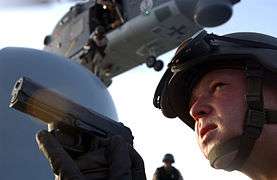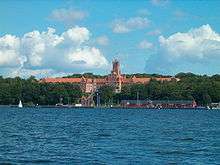German Navy
| German Navy Deutsche Marine | |
|---|---|
 | |
| Founded | 2 January 1956 |
| Country |
|
| Type | Navy |
| Size |
16,242 personnel (10 November 2016)[1] 81 ships 52 aircraft |
| Part of | Bundeswehr |
| Headquarters of the German Navy | Rostock (Navy Command) |
| Motto(s) |
Wir. Dienen. Deutschland (We. Serve. Germany) |
| March | "Gruß an Kiel" |
| Anniversaries | 14 June |
| Engagements | |
| Website |
www |
| Commanders | |
| Inspector of the Navy | Vice Admiral Andreas Krause |
| Deputy Inspector of the Navy | Vice Admiral Rainer Brinkmann |
| Chief of Staff | Rear Admiral Klaus von Dambrowski |
| Notable commanders | |
| Insignia | |
| Naval Ensign |
 |
German Navy Deutsche Marine | |||||||||||||||||||||
|---|---|---|---|---|---|---|---|---|---|---|---|---|---|---|---|---|---|---|---|---|---|
| |||||||||||||||||||||
The German Navy (German: Deutsche Marine or simply German: Marine—![]() listen ) is the navy of Germany and part of the unified Bundeswehr ("Federal Defense"), the German Armed Forces. The German Navy was originally known as the Bundesmarine ("Federal Navy") from 1956 until 1995 when Deutsche Marine ("German Navy") became the official name with respect to the 1990 incorporation of the East German Volksmarine ("People's Navy"). It is deeply integrated into the NATO alliance. Its primary mission is protection of Germany's territorial waters and maritime infrastructure as well as sea lines of communication. Apart from this, the German Navy participates in peacekeeping operations, and renders humanitarian assistance and disaster relief.
listen ) is the navy of Germany and part of the unified Bundeswehr ("Federal Defense"), the German Armed Forces. The German Navy was originally known as the Bundesmarine ("Federal Navy") from 1956 until 1995 when Deutsche Marine ("German Navy") became the official name with respect to the 1990 incorporation of the East German Volksmarine ("People's Navy"). It is deeply integrated into the NATO alliance. Its primary mission is protection of Germany's territorial waters and maritime infrastructure as well as sea lines of communication. Apart from this, the German Navy participates in peacekeeping operations, and renders humanitarian assistance and disaster relief.
History
The German Navy traces its roots back to the Reichsflotte (Imperial Fleet) of the revolutionary era of 1848–52. The Reichsflotte was the first German navy to sail under the black-red-gold flag. Founded on 14 June 1848 by the orders of the democratically elected Frankfurt Parliament, the Reichsflotte's brief existence ended with the failure of the revolution and it was disbanded on 2 April 1852; thus, the modern day navy celebrates its birthday on 14 June.
Between May 1945 and 1956, the German Mine Sweeping Administration and its successor organizations, made up of former members of Nazi Germany's Kriegsmarine ("War Navy"), became something of a transition stage for the navy, allowing the future Marine to draw on experienced personnel upon its formation. In 1956, with West Germany's accession to NATO, the Bundesmarine ("Federal Navy"), as the navy was known colloquially, was formally established. In the same year the East German Volkspolizei See (literally "People's Police Sea") became the Volksmarine ("People's Navy"). During the Cold war the all of the German Navy's combat vessels were assigned to NATO's Allied Forces Baltic Approaches's naval command NAVBALTAP.
With the accession of East Germany to the Federal Republic of Germany in 1990 the Volksmarine along with the whole National People's Army (Nationale Volksarmee, NVA) became part of the Bundeswehr. Since 1995 the name German Navy is used in international context, while the official name since 1956 remains Marine without any additions. As of 31 December 2015, the strength of the navy is 16,045 men and women.[1]
A number of naval forces have operated in different periods. See
- Preußische Marine (Prussian Navy), 1701–1867
- Reichsflotte (Imperial Fleet), 1848–52
- Norddeutsche Bundesmarine (North German Federal Navy), 1867–71
- Imperial German Navy (Kaiserliche Marine), 1871–1919
- Reichsmarine, 1919–35
- Kriegsmarine, 1935–45
- German Mine Sweeping Administration, 1945–56
- Volksmarine the navy of East Germany (GDR) 1956–90
- Marine, 1956–present (Bundesmarine, colloquially)
- German Navy, 1995–present (international contexts)
Current operations
German warships permanently participate in all four NATO Maritime Groups. The German Navy is also engaged in operations against international terrorism such as Operation Enduring Freedom and NATO Operation Active Endeavour.
Presently the largest operation the German Navy is participating in is UNIFIL off the coast of Lebanon. The German contribution to this operation is two frigates, four fast attack craft, and two auxiliary vessels. The naval component of UNIFIL has been under German command.[2]
The navy is operating a number of development and testing installations as part of an inter-service and international network. Among these is the Centre of Excellence for Operations in Confined and Shallow Waters (COE CSW), an affiliated centre of Allied Command Transformation. The COE CSW was established in April 2007 and officially accredited by NATO on 26 May 2009.[3] It is co-located with the staff of the German Flotilla 1 in Kiel whose Commander is double-hatted as Director, COE CSW.
Equipment
Ships and submarines
In total, there are about 81 commissioned ships in the German Navy, including 6 submarines, 10 frigates and 21 auxiliary ships. The displacement of the navy is 220,000 tonnes. In addition, the German Navy and the Royal Danish Navy are in cooperation in the "Ark Project". This agreement made the Ark Project responsible for the strategic sealift of German armed forces where the full-time charter of three roll-on-roll-off cargo and troop ships are ready for deployments. In addition, these ships are also kept available for the use of the other European NATO countries.
The three vessels have a combined displacement of 60,000 tonnes.[4][5] Including these ships, the total ships' displacement available to the Deutsche Marine is 280,000 tonnes.
A total of five Joint Support Ships, two JSS800 and three JSS400, were planned during the 1995-2010 period but the programme appears now to have been abandoned, not having been mentioned in two recent defence reviews. The larger ships would have been tasked for strategic troop transport and amphibious operations, and were to displace 27,000 to 30,000 tons for 800 soldiers.[6] The German Navy will use the Joint Support Ship HNLMS Karel Doorman (A833) of the Royal Netherlands Navy as part of the integration of the German Navy Marines (Seebatallion) in the Royal Netherlands Marine Corps as of 2016.
Aircraft
The naval air arm of the German Navy is called the Marineflieger. The Marineflieger operate approx. 50 aircraft.
| Aircraft | Origin | Type | Versions | Quantity[7] | Notes |
|---|---|---|---|---|---|
| Fixed-wing aircraft | |||||
| P-3C Orion - CUP | |
Maritime patrol | P-3C MPA | 8 | Former Royal Netherlands Navy |
| Dornier Do 228 | |
Pollution control | Do 228 LM/NG | 2 | |
| Helicopters | |||||
| Westland Lynx | |
Maritime helicopter | Mk 88 | 21 | Will be replaced by NH90 NFH |
| Westland Sea King | |
Search and rescue | Mk 41 | 21 | Replacement planned |
| NHI NH90 | |
Maritime helicopter | NFH | 0 | 18 ordered[8] |
| UAVs | |||||
| Camcopter S-100 | |
UAV | S-100 | 0 | 6 on order. |

Structure
The German Navy is commanded by the Inspector of the Navy (Inspekteur der Marine) supported by the Navy Command (Marinekommando) in Rostock.
Formations
- HQ German Navy (Marinekommando), Rostock
- Flotilla 1(Einsatzflottille 1) (HQ Kiel)
- 1st Corvette Squadron (1. Korvettengeschwader), Warnemünde
- 1st Submarine Squadron (1. Ubootgeschwader), Eckernförde
- Submarine Training Centre (Ausbildungszentrum Unterseeboote), Eckernförde
- 3rd Minesweeping Squadron (3. Minensuchgeschwader), Kiel
- 5th Minesweeping Squadron (5. Minensuchgeschwader), Kiel
- 7th Fast Patrol Boat Squadron (7. Schnellbootgeschwader), Warnemünde
- Naval Force Protection Battalion, (Seebataillon), Eckernförde
- Naval Special Forces Command, (Kommando Spezialkräfte Marine), Eckernförde
- Naval Base Command Kiel (Marinestützpunktkommando Kiel)
- Naval Base Command Eckernförde
- Naval Base Command Warnemünde
- 2nd Flotilla (Einsatzflottille 2), Wilhelmshaven
- HQ 2nd Flotilla
- 2nd Frigate Squadron (2. Fregattengeschwader), Wilhelmshaven
- 4th Frigate Squadron (4. Fregattengeschwader), Wilhelmshaven
- Auxiliary Squadron (Trossgeschwader), Wilhelmshaven
- Naval Base Command Wilhelmshaven
- Naval Aviation Command (Marinefliegerkommando), Nordholz
- Naval Air Wing 3 (Marinefliegergeschwader 3), Nordholz
- Naval Air Wing 5 (Marinefliegergeschwader 5), Nordholz
- Naval Support Command (Marineunterstützungskommando — MUKdo)
- Naval Medical Institute (Schiffahrtsmedizinisches Institut), Kiel
- Naval Academy (Marineschule Mürwik), Flensburg
- Petty Officer School (Marineunteroffiziersschule), Plön
- Engineering School (Marinetechnikschule), Parow, near Stralsund
- Naval Operations School (Marineoperationsschule), Bremerhaven
- Naval Damage Control Training Centre (Ausbildungszentrum für Schiffssicherung), Neustadt in Holstein
Ranks
Officers
| NATO code | OF-10 | OF-9 | OF-8 | OF-7 | OF-6 | OF-5 | OF-4 | OF-3 | OF-2 | OF-1 | OF(D) | Student Officer | ||||||
|---|---|---|---|---|---|---|---|---|---|---|---|---|---|---|---|---|---|---|
| Germany (Edit) |
no equivalent | Admiral |
Vizeadmiral |
Konteradmiral |
Flottillen- admiral |
Kapitän zur See |
Fregatten- kapitän |
Korvetten- kapitän |
|
Oberleutnant zur See |
Leutnant zur See |
|
Enlisted rank plus a star indicating cadet's career | |||||
- Seekadett - Officer Cadet
- Fähnrich zur See - Midshipman
- Oberfähnrich zur See - Midshipman / Ensign
- Leutnant zur See - Ensign / Lieutenant Junior Grade / Sublieutenant
- Oberleutnant zur See - Lieutenant Junior Grade / Sublieutenant
- Kapitänleutnant - Lieutenant / Lieutenant Commander
- Stabskapitänleutnant – senior to Kapitänleutnant, same pay grade as Korvettenkapitän, for specialist officers only
- Korvettenkapitän - Corvette Captain
- Fregattenkapitän - Frigate Captain
- Kapitän zur See - Ship-of-the-line Captain
- Flottillenadmiral - Rear Admiral lower half
- Konteradmiral - Rear Admiral upper half / Counter Admiral
- Vizeadmiral - Vice Admiral
- Admiral
Petty officers and enlisted seamen
| NATO Code | OR-9 | OR-8 | OR-7 | OR-6 | OR-5 | OR-4 | OR-3 | OR-2 | OR-1 | |||||||||||||||||||
|---|---|---|---|---|---|---|---|---|---|---|---|---|---|---|---|---|---|---|---|---|---|---|---|---|---|---|---|---|
| (Edit) |
 |
 |
 |
 |
 |
 |
 |
 |
 |
 |
 |
 |
 | |||||||||||||||
 |
 |
 |
 |
 |
 |
 |
 |
 |
 |
 |
 |
 | ||||||||||||||||
| Oberstabsbootsmann | Stabsbootsmann | Hauptbootsmann | Oberbootsmann | Bootsmann | Obermaat | Maat | Oberstabsgefreiter | Stabsgefreiter | Hauptgefreiter | Obergefreiter | Gefreiter | Matrose | ||||||||||||||||
| (Officer designate) (Edit) |
No equivalent | No equivalent |  |
 |
 |
No equivalent | No equivalent | No equivalent | No equivalent | |||||||||||||||||||
 |
 |
 | ||||||||||||||||||||||||||
| Oberfähnrich zur See | Fähnrich zur See | Seekadett | ||||||||||||||||||||||||||
- Matrose - Seaman Recruit
- Gefreiter - Seaman Apprentice
- Gefreiter-UA - Seaman Apprentice E2 - Petty Officer 2nd Class Candidate
- Gefreiter-BA - Seaman Apprentice E2 - Petty Officer 1st Class Candidate
- Gefreiter-OA - Seaman Apprentice E2 - Officer Candidate
- Obergefreiter - Seaman
- Hauptgefreiter - Seaman
- Stabsgefreiter - Petty Officer 3rd Class
- Oberstabsgefreiter - Petty Officer 3rd Class
- Maat - Petty Officer 2nd Class
- Maat-BA - Petty Officer 2nd Class - Probationary Petty Officer 1st Class
- Obermaat - Petty Officer 2nd Class
- Bootsmann - Petty Officer 1st Class
- Oberbootsmann - Petty Officer 1st Class
- Hauptbootsmann - Chief Petty Officer
- Stabsbootsmann - Senior Chief Petty Officer
- Oberstabsbootsmann - Master Chief Petty Officer, Command/Fleet/Force Master Chief Petty Officer
Radio and communication stations
- DH038
- DHJ58
- DHJ59
Future developments
- A first batch of four frigates of the F125 class (Baden-Württemberg class) specialised for persistent stabilization missions is planned to replace all eight Bremen class guided-missile frigates. Each F125 will have two crews. They are expected to enter service between 2016 and 2018.
- Six medium surface combat ships are planned under the name 'Mehrzweckkampfschiff 180' (MKS 180), a multi-mission frigate
- Two more Type 212A submarines will be procured within the next decade.[9]
- Five additional Braunschweig class corvettes will be procured from 2019-2023.[10]
- 18 NH90 NFH Helicopters ordered to replace Lynx in ASW/AsuW role, originally ordered by the German Army as NH90 TTH variant.
- 12 Medium Sized Helicopters are planned to replace the current 22 Sea King helicopters of Naval Air Wing 5 in SAR & ship-based Transport Role (VertRep)
- A first batch of six Camcopter S-100 UAVs for the use on the Braunschweig class corvettes has been ordered (more being planned). Deliveries will take place in 2013.[11]
- Integration of the German Navy Marines (Seebatallion) in the Netherlands Marine Corps and use of the Amphibious ships of the Royal Netherlands Navy such as the Joint Support Ship HNLMS Karel Doorman (A833) as of 2016.
- In May 2013 it was announced by both Ministers of Defence that the German- & Dutch Navy agreed to integrate submarine operations, training and design for future replacements.
See also
- List of active ships of the German Navy
- List of ship classes of the Bundesmarine and Deutsche Marine
- List of ships of the German navies
- List of admirals of the German Navy
- Federal German Ship
- German commando frogmen
- Marineamt
- Marine-Regatta-Verein
- U-boat
- Volksmarine
Further reading (COE CSW)
- Jan Wiedemann: COE CSW celebrates fifth anniversary; in: NAVAL FORCES III/2014 p. 90 f.
- Hans-Joachim Stricker: Centre of Excellence for Operations in Confined and Shallow Waters COE CSW - Das COE als Ausdruck unserer besonderen nationalen Fähigkeiten im Bündnis; in: Marineforum 6-2007 p. 3 f.
- Fritz-Rudolf Weber: Centre of Excellence for Operations in Confined and Shallow Waters - Think Tank für die NATO; in: Marineforum 1/2-2010 p. 11 ff.
- Hans Georg Buss, Stefan Riewesell: Maritime C-IED and Harbour Protection: A Joint Effort; in: The Transformer Fall 2013 Vol 9 Issue 2 p. 18
References
- 1 2 "Die Stärke der Streitkräfte [Personnel strength of German Armed Forces]". 10 November 2016. Retrieved 19 November 2016.
- ↑ "Bilanz und Ausblick". Archived from the original on 1 January 2009. Retrieved 18 December 2009.
- ↑ Deutsche Marine - press release: Neues Nato-Expertenzentrum an der Kieler Förde nimmt Fahrt auf; Faermann, 2009
- ↑ "The ships chartered for the ARK Project". Archived from the original on 8 June 2011. Retrieved 27 October 2010.
- ↑ "The ARK project". Archived from the original on 28 November 2010. Retrieved 27 October 2010.
- ↑ "Inspekteur der Marine : Zielvorstellung Marine 2025+" (PDF). Geopowers.com. Retrieved 2016-03-14.
- ↑
- ↑ "Tiger & N90 orders" (in German). German MOD. 2013-03-15. Retrieved 7 May 2013.
- ↑ Nachrichtenfernsehen, n-tv. "Marine stellt U36 in Dienst: Bundeswehr bekommt neue U-Boote". n-tv.de. Retrieved 2016-11-08.
- ↑ "Koalition will Boote kaufen: Bundeswehr soll fünf neue Korvetten bekommen". Frankfurter Allgemeine Zeitung. 2016-10-14. ISSN 0174-4909. Retrieved 2016-11-08.
- ↑ "Camcopter". Archived from the original on 20 May 2009. Retrieved 2 May 2009.
External links
| Wikimedia Commons has media related to Navy of Germany. |



